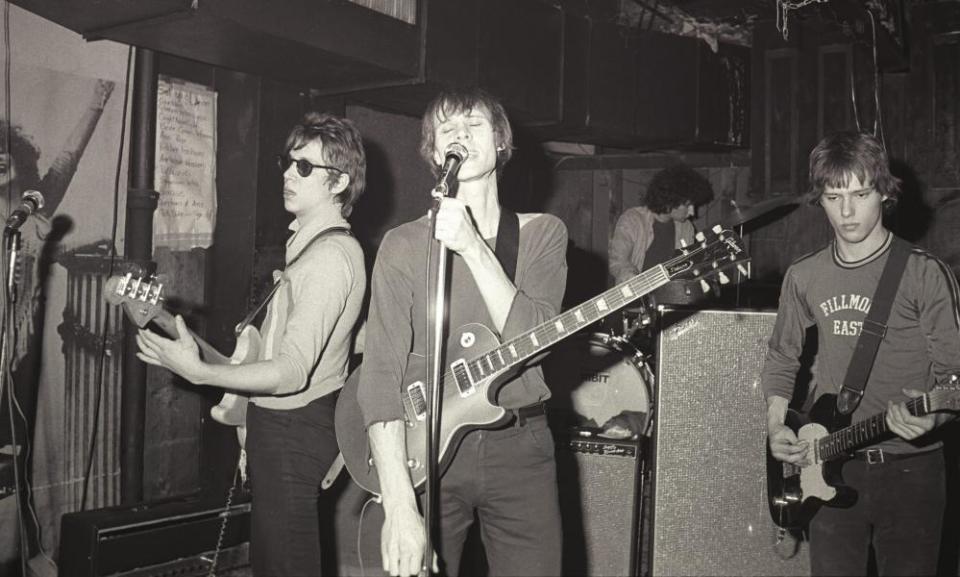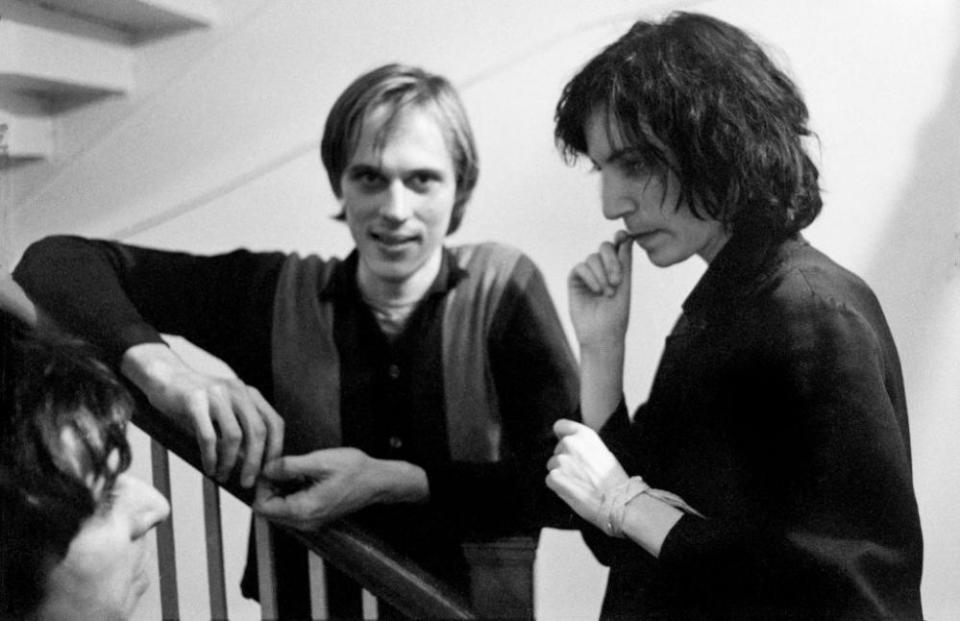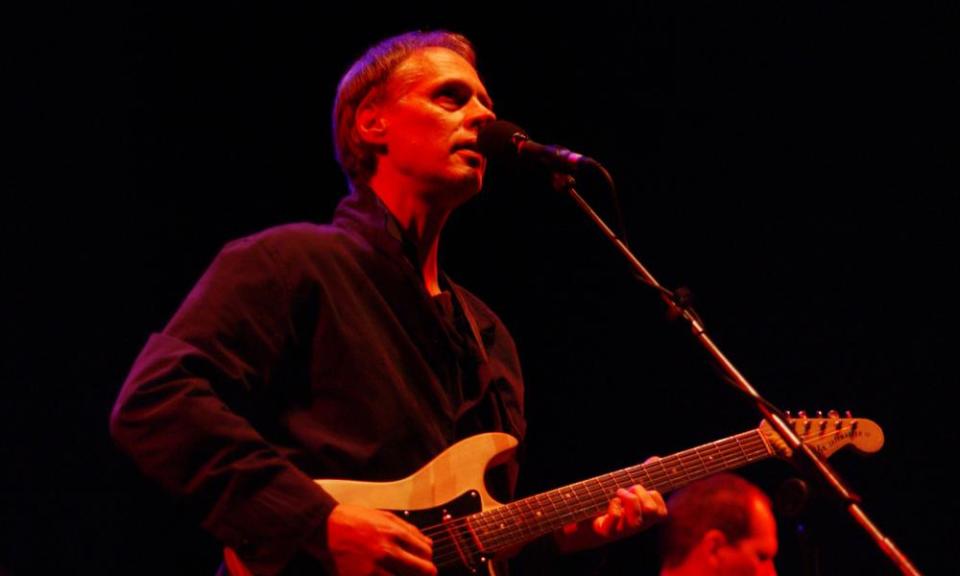Tom Verlaine obituary

As the leader of the New York band Television, Tom Verlaine, who has died aged 73, was a key figure in the coterie of musicians – Blondie, Talking Heads, the Ramones, the Patti Smith Group – who made downtown Manhattan a laboratory of new sounds and new styles in the mid-1970s. Although each of those groups pursued a very different musical path, together their impact would shape what became known as the punk movement, while Television’s debut LP, Marquee Moon, released in 1977, would secure a place among the most admired and enduringly influential albums of its era.
In Smith’s recent publication, A Book of Days, she chooses a photograph from 1974 in which she and Verlaine, then lovers and occasional collaborators, are holding hands in a tableau of sweetly defiant thrift-store chic: a flimsy child-bride’s gown for her, a patchwork leather jerkin for him. But among the artfully distressed apparel, defiant haircuts and painfully skinny silhouettes of their milieu, none of those serving apprenticeships in CBGBs, Max’s Kansas City and other New York clubs showed more concern for the music itself than Verlaine.

“Attitude,” he once said, “will only take you so far, which for me is never far enough.” Instead the career of the visionary singer, songwriter and guitarist, including solo albums and appearances as well as various Television reunions, seemed to represent a constant quest for the perfect blend of musical eloquence and some form of spiritual elevation.
Fittingly for a man who appropriated his stage name from a great French symbolist poet, Verlaine wrote striking lyrics, such as the opening lines of Marquee Moon: “I remember how the darkness doubled / I recall lightning struck itself.” In another early song, Venus, he sang of how “Broadway looked so medieval” – a description both improbable and indelibly perceptive.
But it was his exploratory guitar solos that spoke of his early interest in, and deep knowledge of, the avant-garde jazz of the 1960s. Somehow he managed to find a language midway between the speaking-in-tongues improvisations of the saxophonists John Coltrane and Albert Ayler and the more functional styles of such rock’n’roll, R&B and surf-rock guitarists as James Burton, Steve Cropper and Dick Dale, as well as the expansive psychedelic guitar improvisations of Jerry Garcia and John Cipollina, and to make the result match his own era.

Verlaine’s tightly wound stage presence was compelling, but his personality – his cool reserve, fugitive manner and inherent suspicion of others’ motives – made him a figure of mystery, and worked against his chances of the mainstream success to which, in any case, he never seemed committed.
He was born Thomas Miller in Morriston, New Jersey, into a middle-class family who moved to Wilmington, Delaware, when he was six years old. After classical piano lessons, he switched to saxophone upon discovering jazz and then took up the guitar. At Sanford, a private school in Hockassin, Delaware, where he was a day pupil, he met a boarder from Kentucky named Richard Meyers, with whom he bonded over a love of poetry and a mutual desire to escape the confines of the establishment in which they found themselves. The first attempt ended with both being brought back after being arrested in Alabama for setting a building on fire.
They had made their separate ways to New York by 1971, where they teamed up again on the Lower East Side, changed their names to Tom Verlaine and Richard Hell, scuffled for work and wrote poetry together under the nom-de-plume “Theresa Stern”. But Verlaine, working as a clerk at the Strand bookstore in the East Village, was determined to form a band. He taught Hell the rudiments of playing the bass guitar and together with the drummer Billy Ficca they performed as the Neon Boys before adding another guitarist, Richard Lloyd, and changing their name to Television in 1974.
Related: Tom Verlaine, frontman and guitarist of US band Television, dies at 73
Verlaine’s songs, the compositions of Hell (including the anthemic Blank Generation) and the soaring interplay between the two lead guitarists quickly earned them a following among New York’s scenemakers. Endorsements came from David Bowie and Nicholas Ray, the director of Rebel Without a Cause, whose crisp epithet – “Four cats with a passion” – appeared on their promotional material. Smith, then beginning her rise to prominence, was another early supporter, and Verlaine played on her first single, a version of Hey Joe, in 1974.
Richard Hell, whose spiky hair and ripped T-shirts would inspire Malcolm McLaren’s styling of the Sex Pistols, had already been sacked by Verlaine on the grounds of heroin-induced unreliability by the time Television made their first single. A Verlaine song called Little Johnny Jewel, it was released in 1975 on a label created by their patron, Terry Ork. The following year they signed a deal with Elektra Records and began work on Marquee Moon. The album was co-produced by the studio engineer Andy Johns, who had worked with the Rolling Stones, Free and Led Zeppelin, and who helped Verlaine achieve the clarity of sound for which he was searching.
If the album’s sales were disappointing by the standards of the biggest rock bands of the time, their music was warmly received by the rock press in the US and Europe, and by audiences on their first tour of the UK, with Blondie as their support act. A second album, Adventure, made less impact and the band dissolved in 1978 after disagreements between Verlaine and Lloyd.

Verlaine’s eponymous first solo album was released in 1979, followed two years later by Dreamtime and then by several others, including Cover, completed in 1984 while he was briefly living in London. Two albums of instrumental pieces, Warm and Cool (1992) and Around (2006), showed his gift for creating tone poems inspired by film noir. In 1995 he appeared as a guest with Smith’s band on a US tour with Bob Dylan.
Television briefly reformed in 1992 to release a new self-titled album of the highest quality and toured occasionally both before and after the second departure of Lloyd, who was replaced from 2007 by Jimmy Rip. Their last appearances came in 2013.
• Tom Verlaine (Thomas Miller), guitarist, singer and songwriter, born 13 December 1949; died 28 January 2023

 Yahoo News
Yahoo News 
